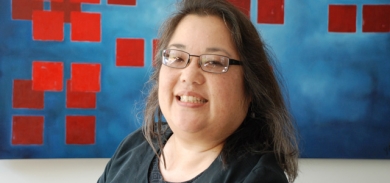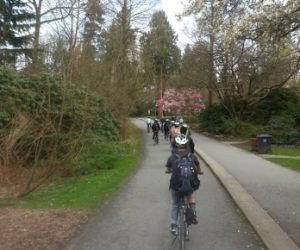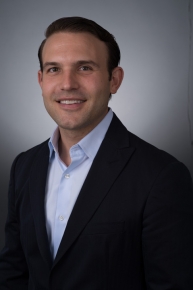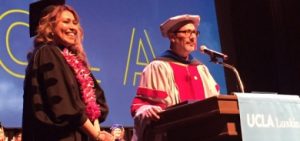Researchers from the UCLA and USC will collaborate on one of the first studies of the experiences of LGBT service members in the military.
The study will lay a foundation for future research of lesbian, gay, bisexual and transgender active-duty service members by exploring how they are integrated into the military; determine if health disparities exist between them and their heterosexual counterparts; and develop recommendations for better assimilation of LGBT service members to promote military readiness.
The two-year, $1.89 million grant marks one of the first times the U.S. Department of Defense has funded a study of this population since the 2010 repeal of “don’t ask, don’t tell,” the law barring homosexuals from openly serving in the military.
“In some ways, we will start with an exploratory study to uncover what it’s like to be an LGBT service member in the military,” said Jeremy Goldbach, assistant professor at the USC School of Social Work, who is one of three principal investigators on this study. The other investigators are Carl Castro, assistant professor at the USC School of Social Work, and Ian Holloway, assistant professor of social welfare at the UCLA Luskin School of Public Affairs.
“No one’s ever asked this question of active-duty service members before because we hadn’t been allowed to. We know very little about this population,” Goldbach said.
About 65,000 service members identify as LGBT. In the general population, LGBT individuals experience stress related to their sexual orientation and/or gender identity. Given the military’s “hypermasculine” culture, active-duty LGBT individuals could experience distinct stress that impacts their health and military readiness.
As news reports have shown, even after the controversial policy’s repeal, acceptance in the military as an LGBT service member has not been universal. The policy changes have not been implemented flawlessly, and experiences of LGBT veterans highlight that many remained uncomfortable serving openly.
The study also comes at a critical time as the department works to update its current policy relating to transgender service members, also allowing them to serve openly in the military.
“We’ll actually be able to talk to transgender service members and see how they feel about this policy shift and if they see an impact on their service,” said Holloway.
The study will consist of two parts: in-depth interviews with 80 lesbian, gay, bisexual and transgender service members from the Army, Navy, Air Force and Marines; and a survey of 480 service members—split evenly between LGBT service members and their heterosexual counterparts.
Advisory boards will also be established with subject-matter experts and LGBT veterans and active-duty service members. The military board will help ensure any developed recommendations are feasible within the military context.
Castro, a retired Army colonel and director of the USC Center for Innovation and Research on Veterans & Military Families, said the scope of the study is purposely ambitious. The inclusion of all the services will make it difficult for any military branch to dismiss the study’s recommendations as not pertaining to it.
Another reason the researchers decided against limiting the scope of the study was because the Defense Department only funded two LGBT projects this year.
“Just think about the magnitude of studies that are needed before any changes can be made,” Castro said. “Turning the dial just a little bit will not get us anywhere.”
“One of our goals is to lay a solid foundation for other researchers to build upon when they focus on single services,” he added.
The study benefits from the unique perspectives and expertise of each of the investigators.
Castro is a subject-matter expert in the military, including how service members integrate into the military and transition to civilian life. USC colleague Goldbach has studied LGBT mental health issues. Holloway’s research expertise includes analysis of LGBT social networks, which can contribute to health outcomes.
“All good research is collaborative and multidisciplinary,” Castro said. “This is recognition that it takes a lot of people from different areas and disciplines to pull this off.”
“This was a perfect recipe,” Goldbach added. “Without the three of us, this project would not have been possible.”
Goldbach’s research has focused on how stigma creates stress for people and how that results in poor health outcomes. “If someone is experiencing stress, then he or she is coping in some way,” he said. “One of the ways to cope is to seek resources through social networks.”
A focus on LGBT service members’ social networks is an important aspect of this project. Social networks refer to the relationships and bonds that surround individuals, such as family, friends, romantic relationships and colleagues, among others. Holloway said these networks can have great impact on the health and well-being of individuals.
“The basic idea is that LGBT people face the same stressors as heterosexuals, but they also face additional ones that are unique to them based on discrimination and exclusion,” Holloway said. “Supportive social networks can buffer those stressors.”
In the military, these networks are the bonds between service members and their leaders that form cohesion, a hugely important aspect in sustaining unit readiness, performance and effectiveness in combat, Castro said.
Whether and how active-duty LGBT service members have disclosed their sexual orientation and/or gender identity and how their supervisors and fellow service members have reacted can impact their networks and, in turn, their well-being.
“I think all of us feel a tremendous sense of responsibility,” Holloway said. “Our study will be able to elicit from LGBT military personnel themselves what they see as their challenges and provide insights to improve their individual outcomes and improve the overall organizational structure.”
About the UCLA Luskin School of Public Affairs: Founded in 1994 and dedicated in 2011, the UCLA Luskin School of Public Affairs is a leading institution for research and scholarship in the areas of public policy, social welfare and urban planning. Based in the global metropolis of Los Angeles, UCLA Luskin develops creative solutions and innovative leaders that confront challenges in immigration, drug policy, prison reform, transportation, the environment, and other areas vital to the continued health and well-being of our global society. For more than 65 years, the UCLA Department of Social Welfare has maintained a commitment to advancing education and scholarship in service of society’s most vulnerable communities.
About the USC School of Social Work: The University of Southern California’s School of Social Work ranks among the nation’s top social work graduate programs. A recognized leader in academic innovation, experiential learning, online education and translational research, the school prepares students for leadership roles in public and private organizations that serve individuals, families and communities in need. The school is the first research university to offer a large-scale military social work program that prepares students to care for service members, veterans and their families, helping them cope with the stresses of military life. The school’s Center for Innovation and Research on Veterans & Military Families focuses its research efforts on understanding all facets of military transitions.





